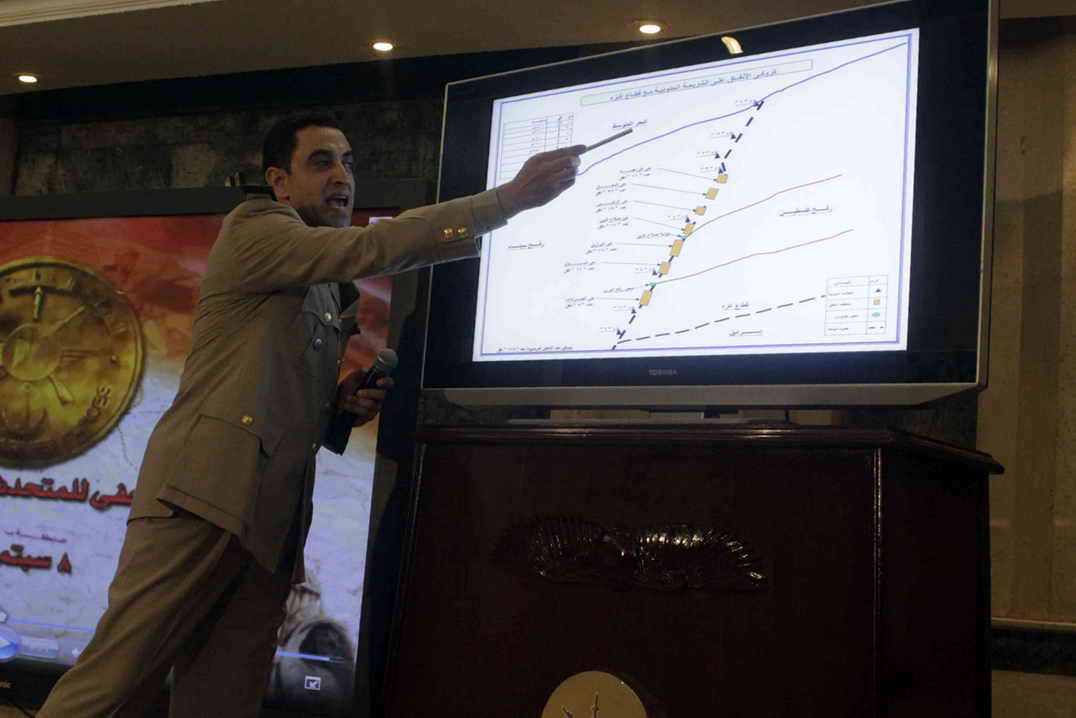This year, the American University in Cairo press intends to bring Sudanese novelist Tarek Elyateb’s work to a wider audience with its latest translation of his most famous work to date, “Cities without Palms.
For the most part of last century, Sudanese literature has been defined by the voice of one man: the late El-Tayeb Salih who passed away a few months ago. Salih’s shadow reigned supreme over the Sudanese novel, and for good reason. His most celebrated works, “Season of Migration to the North and “The Wedding of Zein among, were informed by themes of colonization, gender politics and dislocation. The richness of his work and the multiple layers of his stories were remarkably distinctive, and few Sudanese novelists were able to produce works that rivaled them.
Among the most notable names of present Sudanese literature are Ashraf Abbas Taha, Kareem Abdelgadir and, most famous, Leila Aboulela. One name that remained largely obscure until recently is Cairo-born Tarek Eltayeb.
Emerging at the beginning of last decade with acclaimed novels such as “Bayt An-Nakhil (The Palm House) and “Mudun Bila Nakhil (Cities without Palms), in addition to a number of volumes of short stories (“A Camel does not Stop on Red , “The Elevator and a poetry collection “In Clear ), Eltayeb won critical acclaim in both Egypt and the Arab world at a time when interest in Arab literature was at its lowest.
First published in 1992 in Arabic, “Palms is an enlightening short novel of a modest scope; an odyssey of a young Sudanese man away from his dying village and into an unknown, world.
The main protagonist of the story is Hamza, a young Sudanese man living in the deeply impoverished village of Wad Al-Nar, a place with no prospects, no food, no work and no hope. His father abandons him, his mother and two little sisters, forcing him to provide for his family at an early age.
Hamza has mixed feelings about his childhood. His hatred for his abusive father is undeniable, and so is his contempt for the village’s slimy, hypocritical and equally abusive preacher Sheikh Ali Al-Faki. Both men are failures, charlatans burying their worthlessness through exercising their physical superiority on the young kid for trifle reasons like laughing during prayer.
“The lashes burnt my body, each one trying to make me repent and come to my senses, Hamza recounts. “In the evening, the sheikh would relate this to my father, who in turn would seize the opportunity to beat me. My father would strike me even more harshly than usual in the presence of the sheikh, as if to prove to him that he was punishing me the best that he could.
“And as my father’s insults increased, so did my hatred for the sheikh.
Despite the cruelty, sense of abandonment and poverty, Hamza retains several happy moments from his childhood, memories of his little sisters, of his caring mother and of their generous neighbors. These moments that comfort him later in his long turbulent journey.
Poverty infiltrates deeper into the village, obliterating the green palms that used to adorn it.
“Our Village has changed. It used to be green. And I used to be happy among its palms. Now it has become a graveyard, a gaping tomb that swallows its victims and slowly digests them.
Thus Hamza’s journey begins, leaving his hometown for the city – where he initially gets embroiled in crime and falls in love with the wife of his married employer – and onward to Egypt, Italy, the Netherlands and France.
For a journey of Hamza’s scale, “Palms feels too short, too quick. Apart from allowing Hamza to express his amazement at few of the city’s features, Eltayeb leaves little room for his leading man to reflect upon the new worlds he encounters. Hamza briefly chronicles his lust for Cairo’s kebab, his astonishment regarding the sexual liberty in Europe and the racism he faces there. But that’s about it.
His journey is grounded to earth; a simple, straightforward struggle for survival. He doesn’t have the luxury to contemplate what he sees, to draw any meaning from the hurdles he confronts or to ponder his place in the world. Eltayeb isn’t interested in sketching a broad social portrait of his country, nor does he touch upon politics either. The setting of his childhood doesn’t function as social critique; Eltayeb uses it as a mere backdrop to illustrate the progressive numbness of Hamza’s emotions, his transformation into a scarecrow. His story is strictly personal, and that’s both the strength of the novel and its weakness.
Eltayeb brings Hamza’s inner turmoil to the forefront of the story, and it’s his sense of displacement, homesickness, loss and aggravation that makes “Palms a compelling read. The lack of detail though somehow undermines the central inner conflict of the story. Hamza essentially appears to be besieged in a void with no features.
Kareem James Palmer-Zeid’s translation, on the other hand, doesn’t flow smoothly. Some parts suffer from palpable clumsiness; others fall short of conveying the poetry of the original text’s imagery.
Despite his flaws, Eltayeb manages to sustain Hamza’s emotional devastation that reaches its apex with the unavoidable tragic conclusions.
Like thousands of displaced Sudanese around the world, Hamza is a lone man crushed by a callous, incomprehensible destiny; a man invisible to himself and to the world around him.
Hamza would appear again in Eltayeb’s superior, dense second novel “The Palm House. Hamza finds no resting place, his struggle is never-ending. He survives for the sheer sake of survival. His moments of happiness are rare; his past never ceases to leave him. He walks alone in an indifferent world with nothing to console him but a handful of memories from a distant place that no longer exists.

